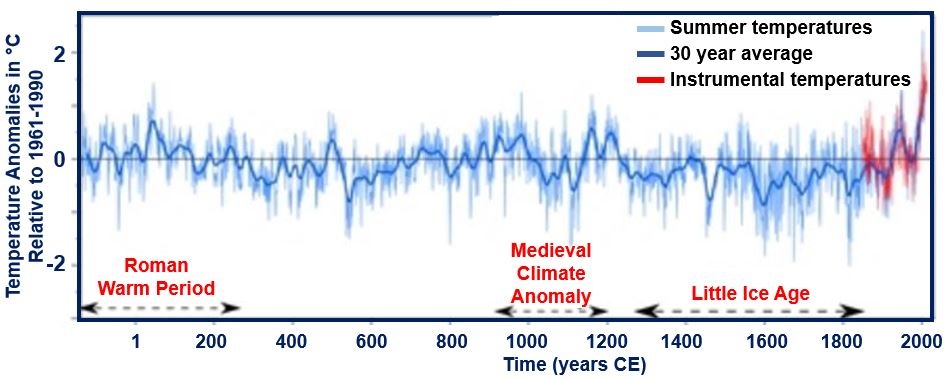Britain has recently had the hottest summers since Roman times, specifically since the warmer Roman summers that were common up to the 3rd century AD. Scientists from Swansea University in Wales, as well as 45 researchers from 13 different nations, found that British and European summers over the past thirty years have been repeatedly breaking heatwave records, and evidence suggests we are the cause.
Britons had better get used to the heat, because it is most likely to get worse, the scientists warn. What is classed as abnormal today is likely to become the norm in future.
The researchers, who published details of their study and findings in the academic journal Environmental Research Letters, warn that current climate models have probably underestimated how severe and frequent future record-breaking heatwaves in Europe will be.
 European summer temperature variations 137 BCE to 2003 CE and associated uncertainties. (Image: swansea.ac.uk. Credit: J.P. Werner/EuroMed2k Members)
European summer temperature variations 137 BCE to 2003 CE and associated uncertainties. (Image: swansea.ac.uk. Credit: J.P. Werner/EuroMed2k Members)
Virtually every part of Europe has experienced abnormally hot summers over the last thirty years, accompanied by severe heatwaves in 2003, 2010 and 2015.
Weather patterns reconstructed over past 2100 years
In this latest study, which puts the current warmth in a context spanning 2100 years, using tree-ring data and historical documentary evidence, scientists have managed to create a summer temperature reconstruction dating back to Roman times.
During Roman times, warm summers were experienced until the 3rd century AD, followed by cooler temperatures from the 4th to 7th centuries.
A relatively warm medieval period was followed by a much colder Little Ice Age from the 14th to 19th centuries. The tree-ring data clearly shows how from the beginning of the 20th century until now, temperatures have increased markedly.
Climate models may be making wrong forecasts
After gathering and analyzing all the data available, the researchers report that past natural changes in summer temperatures in Europe are greater than previously thought, suggesting that climate models could be seriously underestimating the full range of future extreme weather events, including heat waves.
Historically, until 30 years ago, the fluctuations in summer temperatures were mainly influenced by large volcanic eruptions and changes in how much energy the Earth’s surface received from the Sun.
 Our summers have not been so hot since Roman times.
Our summers have not been so hot since Roman times.
Temperatures over the past thirty years, however, lie outside the range of these natural variations, the authors wrote. They say their findings support the conclusions reached by the IPCC (Intergovernmental Panel on Climate Change), that recent warming is being mainly driven by human activity (anthropogenic activity).
Put simply, the researchers say we (humans) are causing the recent record-warm summers.
Professor Danny Mccarroll, who works in Swansea University’s Department of Geography and led the team using tree rings to reconstruct the climate of the past, said:
“We now have a detailed picture of how summer temperatures have changed over Europe for more than two thousand years and we can use that to test the climate models that are used to predict the impacts of future global warming.”
 Record heatwaves are likely to become much more common in future.
Record heatwaves are likely to become much more common in future.
“These results are a clear indication that we have already changed the climate of Europe. There have been warm periods in the past, but summer temperatures over the last 30 years are beyond the range of natural variability.”
Human-induced global warming now a reality
Neil Roberts, Professor of Physical Geography at Plymouth University in England, who was among the contributors to the study, said:
“We have always known that temperatures have fluctuated over many centuries, but wanted to test whether the warm weather experienced in recent years was exceptional when viewed over a longer timescale. This study demonstrates that it is, and helps to confirm that human-induced global warming is now a reality, not just a possibility.”
Study coordinator, Professor Jürg Luterbacher from the University of Giessen in Germany, said:
“We now have a detailed picture of how summer temperatures have changed over Europe for more than 2,000 years and we can use that to test the climate models that are used to predict the impacts of future global warming.”
Citation: “European summer temperatures since Roman times,” D Zanchettin, H Zhang, J Luterbacher, J P Werner, J E Smerdon, L Fernández-Donado, E Xoplaki, N Yuan, F J González-Rouco, D Barriopedro, H Wanner, O Wetter, F C Ljungqvist, U Büntgen, E Zorita, S Wagner, J Esper, L von Gunten, E Wahl, D McCarroll, A Toreti, D Frank, J H Jungclaus, A Schurer, O Solomina, M Barriendos, C Bertolin, O Bothe, R Brázdil, D Camuffo, P Dobrovolný, N Roberts, A Schindler, M Gagen, E García-Bustamante, Q Ge, J J Gómez-Navarro, J Guiot, Z Hao, G C Hegerl,V V Klimenko, K Holmgren, C Pfister, J Martín-Chivelet and C Zerefos. Environmental Research Letters, Volume 11, Number 2. 29 January 2016. DOI: 10.1088/1748-9326/11/2/024001.
Video – David Attenborough and Tim Flannery on Climate Change
